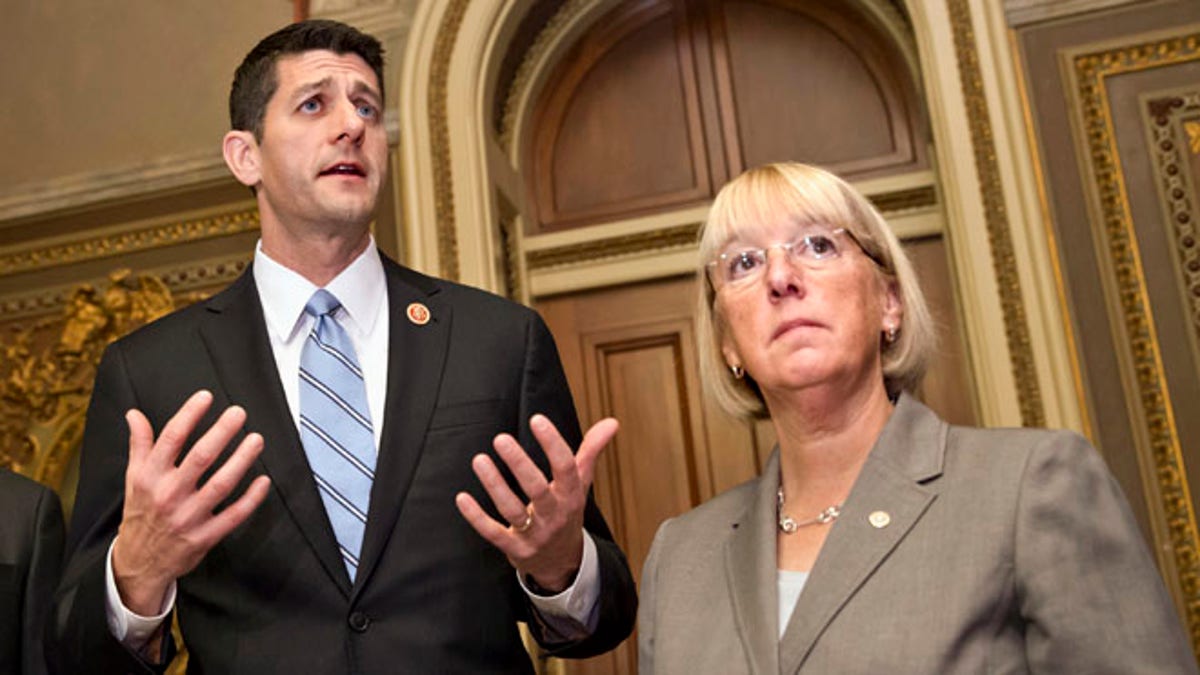
Oct. 17, 2013 file photo of House Budget Committee Chairman Rep. Paul Ryan, R-Wis. and Senate Budget Committee Chair Patty Murray, D-Wash., on Capitol Hill in Washington. ((AP))
Congressional budget negotiators say they've reached a tentative deal and plan to announce the details Tuesday evening.
Ahead of the announcement, influential conservative groups were lining up against the emerging plan out of concern that it unravels hard-fought spending cuts.
The opposition complicates lawmakers' efforts to hammer out a deal before the holiday break. Facing a Jan. 15 deadline to pass a new budget or trigger a partial government shutdown, House and Senate negotiators continued to meet Tuesday.
Fiscal hawks were most concerned about signs that lawmakers could move to chip away at a 2011 budget pact, considered by conservatives to be the most significant deficit-trimming legislation of the past five years. Lawmakers are said to be considering restoring some of the funding hit by the so-called sequester and raising spending levels above the $967 billion level set in the 2011 deal.
Fox News has learned that both sides are looking at discretionary spending caps of just over $1 trillion for each of the next two years.
Urging lawmakers to oppose any deal that raises spending above that level, Americans for Prosperity President Tim Phillips said any Republicans who support it would be "joining liberal Democrats in breaking their word to the American people to finally begin reining in government over-spending that has left us over 17 trillion in debt."
FreedomWorks and Heritage Action similarly came out against any plan that increases spending. These groups are particularly influential in the House, where many sitting Republican members won election with their help.
On the other side of the aisle, a senior House Democratic source told Fox News "the deal still isn't sitting well with House Democrats."
The hesitation, and opposition, on both sides indicates that congressional leaders still have a lot of convincing to do, even if a tentative plan is soon unveiled.
House Speaker John Boehner claimed Tuesday he was "optimistic" about the chances for a deal.
But the speaker likely would be reluctant to once again try to pass a bill that a majority of Republican members do not support -- he resorted to passing a budget bill with a majority of Democrats in October, in order to end the partial shutdown.
The lead negotiators on a budget plan are Sen. Patty Murray, D-Wash., and Rep. Paul Ryan, R-Wis.
"They are both trying to thread a needle," one senior Senate aide said. "Not easy."
The two have been holding secretive talks for weeks aimed at producing an accord to replace some, but not all, of the automatic spending cuts known as sequestration. Budget experts briefed on the talks predict that any bargain may replace $40 billion -- about half of the cuts for the 2014 fiscal year -- and a lesser amount for 2015.
The automatic cuts are the consequence of Washington's failure to follow up a 2011 budget pact with further deficit cuts. They would carve $91 billion from the day-to-day budgets of the Pentagon and domestic agencies when compared with sending limits set by the hard-fought 2011 budget agreement.
"I am really...cautiously optimistic that we have a deal," said Senate Appropriations Committee Chairwoman Barbara Mikulski, D-Md. "No. 2, that we get a top line for two years and a partial cancelling of sequester. The good news is we didn't let them shred the social safety net."
The central elements to the potential agreement, aides and budgets experts briefed on the talks say, would be to require federal workers to contribute more to their pensions, increase a post-Sept. 11 security fee to add $5 to the cost of a typical round-trip flight and require corporations whose pension plans are guaranteed by the government to pay higher premiums. Medicaid payments to hospitals that care for a "disproportionate share" of uninsured people may also get cut.
Fox News' Chad Pergram and The Associated Press contributed to this report.




